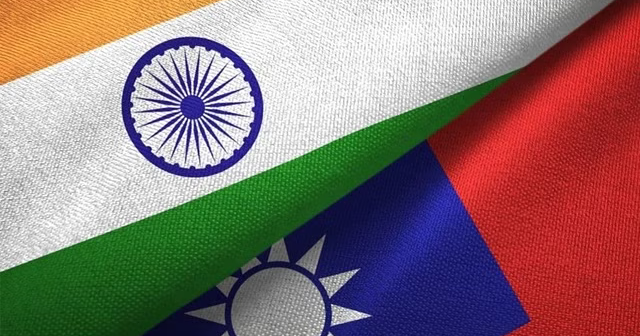India and Taiwan, two thriving Asian democracies, have historically maintained an informal relationship shaped by geopolitical sensitivities. However, a changing world order and the evolving needs of both countries present a compelling case for enhancing ties, particularly in the realms of trade, technology, and strategic cooperation.
The Economic Imperative
Taiwan is a global powerhouse in the semiconductor industry, a critical sector where India has growing ambitions. India’s vast market and skilled workforce, combined with Taiwan’s manufacturing expertise and technological prowess, offer immense potential for collaboration in chip design, manufacturing, and research and development.
Deepening this partnership can make India a part of resilient global supply chains, helping to diversify them away from excessive reliance on China and bolstering its domestic semiconductor production capabilities. India’s own initiatives, such as the Production Linked Incentive Scheme (PLI) for semiconductors, provide a platform for Taiwanese investment and joint ventures.
Beyond semiconductors, India and Taiwan have much to offer each other. India’s growing consumer market presents vast opportunities for Taiwanese firms in electronics, machinery, and precision manufacturing. Conversely, India can benefit from Taiwan’s expertise in agriculture, renewable energy, and healthcare services – areas where Taiwanese innovation could support India’s development goals.
Currently, bilateral trade between India and Taiwan remains below potential, standing at around $7 billion annually. A robust bilateral trade agreement could address tariff and non-tariff barriers, unlocking untapped growth potential for businesses in both countries. It would create a predictable and streamlined framework, encouraging reciprocal investments and promoting joint ventures.
Technological Synergy
In an era driven by digital transformation, India and Taiwan can be formidable partners. Taiwan’s strengths in advanced technologies such as artificial intelligence (AI), the Internet of Things (IoT), and 5G complement India’s vast pool of IT talent and ambitious digitization programs.
Collaboration in research, development, and skill-building in these cutting-edge areas can give both India and Taiwan a lead in the global digital economy. Partnerships with Taiwanese companies in smart manufacturing solutions can boost India’s ‘Make in India’ initiative, attracting foreign investments while upgrading domestic industries.
Furthermore, India’s prowess in software development and Taiwan’s hardware excellence create a natural synergy, enabling joint ventures in fields like smart cities, e-governance, and healthcare innovation. These collaborative efforts would benefit immensely from closer ties at both the government-to-government and business-to-business levels.
Strategic Convergence
India and Taiwan share a commitment to democratic values and a rules-based international order. In the Indo-Pacific region, both nations face the challenge of an increasingly assertive China. While maintaining a delicate balancing act, both India and Taiwan have a vested interest in preserving a stable and multipolar regional order.
Strategic cooperation, even in a limited capacity, can encompass enhanced maritime security dialogue, cybersecurity collaboration, and intelligence-sharing to counter shared threats. This cooperation would complement, not challenge, India’s existing strategic partnerships and its commitment to non-alignment.
Closer India-Taiwan ties could also contribute to enhanced cooperation among like-minded democracies in the region, particularly those within the Quad framework (India, the United States, Japan, and Australia). Sharing best practices and experiences can strengthen democratic resilience and promote greater openness, transparency, and respect for individual freedoms.
Beyond Geopolitics: People-to-People Ties
The foundation of stronger bilateral relations lies in deepening people-to-people connections. Facilitating tourism, academic exchanges, and cultural collaborations can foster greater understanding and goodwill between the people of India and Taiwan.
India’s rich cultural heritage and Taiwan’s vibrant society offer a wealth of opportunities for tourism promotion. Expanded educational collaboration would allow both countries to benefit from each other’s academic strengths and nurture a new generation of leaders well-versed in India-Taiwan relations.
Navigating Complexities
It is important to acknowledge that enhancing India-Taiwan relations must be handled with sensitivity and strategic prudence. India adheres to the One-China policy and will need to carefully navigate its ties with Taiwan in order to avoid upsetting its complex relationship with Beijing. However, this should not preclude deepening economic and technological engagement with Taiwan within that framework.
A gradual and calibrated approach, focused primarily on economic and non-political areas, can create the space for building stronger ties. India can benefit from drawing on the experiences of other countries that maintain robust ties with Taiwan while also acknowledging China’s concerns.
Conclusion
India and Taiwan stand at a pivotal moment where the strategic and economic arguments for closer ties are increasingly compelling. By seizing this opportunity, they can unlock significant benefits in trade, technology, and strategic cooperation, while contributing to a more secure and prosperous Indo-Pacific region. It’s time for India and Taiwan to move beyond cautious diplomacy and unlock their full potential as partners in the 21st century.





